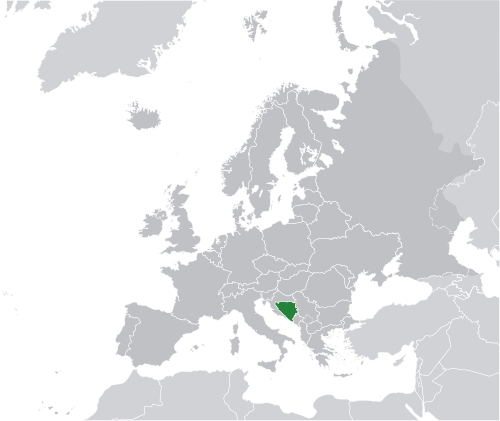 Bosnia and Herzegovina (pronounced /ˈbɒzni.ə (ænd) hɜrtsɨˈɡoʊvɨnə/ or /ˌhɜrtsɨɡoʊˈviːnə/; Bosnian,Croatian, Serbian Latin: Bosna i Hercegovina; Bosnian and Serbian Cyrillic: Босна и Херцеговина) is a country in South-Eastern Europe, on the Balkan Peninsula. Bordered by Croatia to the north, west and south, Serbia to the east, and Montenegro to the southeast, Bosnia and Herzegovina (also: Bosnia-Herzegovina/Bosnia and Hercegovina) is almost landlocked, except for 26 kilometres (16 miles) of Adriatic Sea coastline, centered on the town of Neum. The interior of the country is mountainous centrally and to the south, hilly in the northwest, and flatland in the northeast. Inland is the larger geographic region with a moderate continental climate, marked by hot summers and cold, snowy winters. The southern tip of the country has a Mediterranean climate and plane topography.
Bosnia and Herzegovina (pronounced /ˈbɒzni.ə (ænd) hɜrtsɨˈɡoʊvɨnə/ or /ˌhɜrtsɨɡoʊˈviːnə/; Bosnian,Croatian, Serbian Latin: Bosna i Hercegovina; Bosnian and Serbian Cyrillic: Босна и Херцеговина) is a country in South-Eastern Europe, on the Balkan Peninsula. Bordered by Croatia to the north, west and south, Serbia to the east, and Montenegro to the southeast, Bosnia and Herzegovina (also: Bosnia-Herzegovina/Bosnia and Hercegovina) is almost landlocked, except for 26 kilometres (16 miles) of Adriatic Sea coastline, centered on the town of Neum. The interior of the country is mountainous centrally and to the south, hilly in the northwest, and flatland in the northeast. Inland is the larger geographic region with a moderate continental climate, marked by hot summers and cold, snowy winters. The southern tip of the country has a Mediterranean climate and plane topography.
The country is home to three ethnic groups or so-called “constituent peoples,” a term unique for Bosnia-Herzegovina. These are: Bosniaks, the largest population group of three, with Bosnian Serbs in second and Bosnian Croats in third. Regardless of ethnicity, a citizen of Bosnia and Herzegovina is often identified in English as either Herzegovinian or Bosnian. The term Herzegovinian and Bosnian is maintained as a regional rather than ethnic distinction, while Herzegovina has no precisely defined borders of its own. The country is politically decentralized and comprises two governing entities, the Federation of Bosnia and Herzegovina and Republika Srpska, with a third region, the Brčko District being administered by both.
Formerly one of the six federal units constituting the Socialist Federal Republic of Yugoslavia, Bosnia and Herzegovina gained its independence during the Yugoslav wars of the 1990s. Bosnia and Herzegovina can be described as a parliamentary democracy that is transforming its economy into a market-oriented system, and it is a potential candidate for membership in the European Union and has been a candidate for NATO membership since April 2010, when it received a Membership Action Plan at the summit in Tallinn. Additionally, the nation has been a member of the Council of Europe since 24 April 2002 and a founding member of the Mediterranean Union upon its establishment on 13 July 2008.
Bosnia and Herzegovina has a rich literature, including poets such as Antun Branko Šimić, Aleksa Šantić, Jovan Dučić and Mak Dizdar and writers such as Ivo Andrić, Meša Selimović, Semezdin Mehmedinović, Aleksandar Hemon, Branko Ćopić, Miljenko Jergović, Isak Samokovlija, Abdulah Sidran, Petar Kočićand Nedžad Ibrišimović. The National Theater was founded 1919 in Sarajevo and its first director was famous drama-play writer Branislav Nušić. Magazines such as Novi Plamen, Most and Sarajevske biljeznice are some of the more prominent publications covering cultural and literary themes.
Never particularly robust, Bosnia and Herzegovina’s economy was shattered by the civil war that broke out after independence. Historically, the economy has depended on agriculture, although it now provides less than half of the country’s food needs. Wheat, corn, oats, and barley are the principal products of Bosnia and tobacco, cotton, fruits, and grapes of Herzegovina. Livestock is also raised. Mining is important, and there are significant deposits of lignite, iron ore, bauxite, copper, lead, zinc, manganese, and other minerals. Vehicle and aircraft assembly, oil refining, and the manufacture of steel, textiles, tobacco products, wooden furniture, and domestic appliances are important. There has been some development of the country’s hydroelectric resources. Metals, clothing, and wood products are exported, and machinery, chemicals, fuels, and foodstuffs are imported. The main trading partners are Croatia, Italy, Slovenia, and Germany.
Notes from Wikipedia and Answers.com









